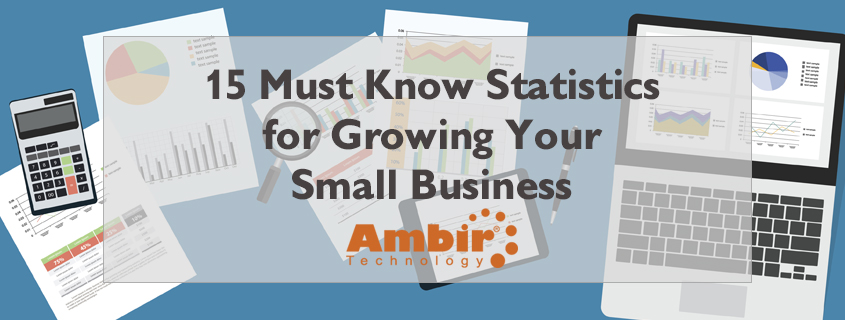15 Must Know Statistics for Growing Your Small Business
Keeping up with trends in your industry or among small businesses in general can be difficult. Small business owners usually handle more than one job within their company, and researching benchmarks or checking in on the status of the economy isn’t always at the top of the to-do list. We’ve gathered 15 of the best stats and facts about small business growth and management so you don’t have to spend time researching.
1. According to the United States Small Business Administration, there are more than 28 million small businesses in the nation. The SBA defines small businesses as those with less than 500 employees, and if you’re among those numbers, you can rest assured that you’re not alone and that plenty of other companies want to provide this huge market segment with viable tools, products and services.
2. In fact, so many people are supporting small businesses in various ways, growth is fairly strong. Since 1995, small businesses have accounted for 65 percent of the net job growth in the country, and around 50 percent of those working in the United States do so for small companies.
3. The longer you manage to stay in business, the more likely you’ll do so. About two-thirds of businesses make it past the two year mark, and half will survive through five years. Small business owners who are just starting out shouldn’t give up easily during the first couple of years, which are typically the hardest for all businesses.
4. Small businesses are growing: a 2015 report indicated that businesses with less than $5 million in revenue per year experienced a year-over-year growth of 7.8 percent, which was up a percent from the previous year. That means the modern market isn’t completely unfriendly to SMBs.
5. Marketing challenges are a common conundrum for small business owners: more than three-quarters say they face them. You aren’t alone in dealing with the complexity of modern marketing, so don’t be afraid to reach out for help from experts as you try to build your brand.
6. Among start-ups that didn’t make it, 42 percent said it was because they had products that didn’t cater to what the market wanted or needed. No matter how passionate you are about a thing, if you can’t create a customer base, it’s not a viable business.
7. Economic times may be influx and frightening, but the Small Business Association notes that economic factors the past few years have signaled a strengthening economy; the growth rate has been between 1.2 and 2.5 percent. If you’re putting off starting or growing your business for economic reasons, it’s never the perfect time, but it’s not as bad a time as you might think.
8. Almost half of businesses fail because of what the Indiana Small Business Development Center calls incompetence. New and even established business owners don’t always have expertise in every field, so boost success by partnering with those who do.
9. Lack of experience managing processes and people was another leading cause of business failure. Entrepreneurs who want to turn their passion into a successful business venture might consider developing relationships with mentors or coaches that can help them increase their own leadership skills.
10. The ISBDC also notes that fraud and natural disasters can cause a business to stumble. Planning ahead, preparing for emergencies, and protecting your information and assets is important for ongoing success.
11. Around 69 percent of people start a business in their home and move to an outside office later only if the income and space need warrant it. No matter where you start your business, being smart about money and spending can bolster your success.
12. A large majority of people — approximately 82 percent — start businesses with personal funds. Since businesses require a median initial investment of $15,000, that’s not an impossible dream for many people.
13. It’s never too late or too early to start a business. Between 15 percent and 20 percent of adults in any age grouping have started a business or own their own business.
14. Real estate, finance and insurance have a 58 percent successful start-up rate, so industry does matter. Even so, you should always choose the industry that that you feel you’ll be most successful in.
15. Finally, if you work with a partner who balances your own skills and strengths with some of their own, you’ll be more likely to raise capital and grow viably.





Leave a Reply
Want to join the discussion?Feel free to contribute!